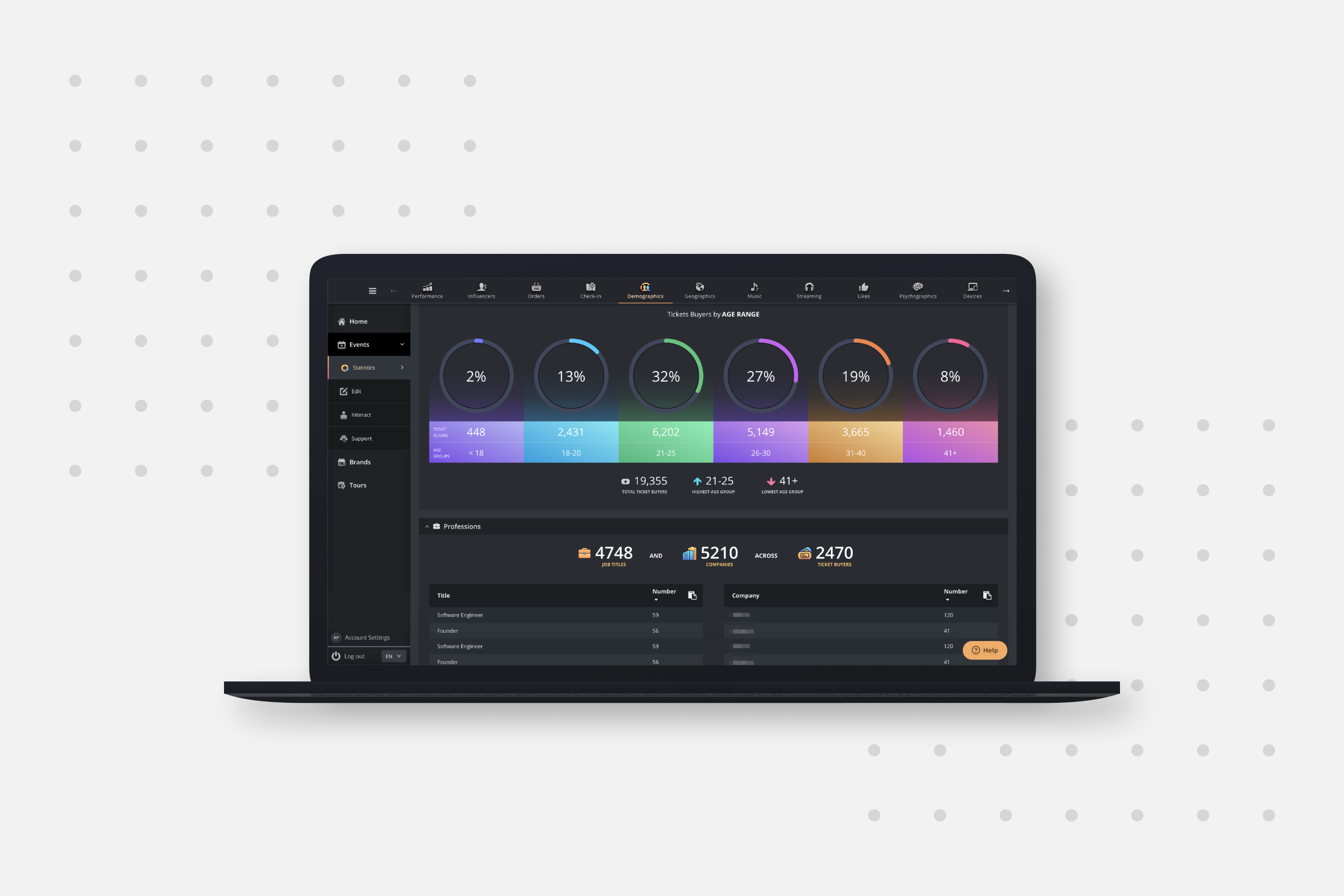Okay, so the fact that ticketing & event management apps have completely changed the way people attend events is undeniable. Box offices are no more. Over 60% of event planners agree that bespoke apps increase their attendee engagement. Moreover, events fueled by event planning and ticketing apps generate 42% more social media impressions when contrasted with those that aren’t.
Basically, ticketing & event management apps have become a must have for event organizers and promoters since they boost interest prior to the event, simplify the entire process, build connections, link platforms, as well as allow for real-time feedback and easy communication. Similarly, event attendees also have learned to depend on them for their convenience and accessibility. So if your next venture involves ticketing and event management, use this ultimate guide as a checklist for all your must-haves.

Key Features of Ticketing & Event Management Apps
Depending on the needs of your business you may need to customize your event management and ticketing application. However, to make it efficient for both event organizers and attendees, consider this list of essential features:
Main Users Application Features for Ticketing & Event Management App
- Events search – This is where it all starts as far as customer experience goes. Looking for events is why they downloaded your app. Thus, this feature has to be flawless, intuitive and easy to use or you’ll be looking at high uninstall rates. This feature should let users customize and set filters to help them find the events they want to attend. (We’ll talk more about filters in a bit.) A big bonus would be to customize home page events to be sorted by the user’s location and the start date so that they can find the events that are closest to them easily without even searching for them.
- User Registration – User registration is another essential feature. True, it’s not the most fun part for your users so you want to quickly guide them through the sign up process. The form typically includes name, gender, location, e-mail address, etc. To simplify the process for your users consider implementing SSO. User registration lets app owners understand who their users are. This data will be important when it comes time to offer customized experiences.
- Custom bookmarking – This lets users bookmark which events they want to attend. With just one click, users should be able to view all the events they saved and plan to attend.
- Seat Map and Time Slots – When looking to attend an event, users typically want to know to be able to choose where they sit and what time they will attend. This is why it’s so imperative to offer both options of a seat map and time slots. Seat maps allow users to see where they will sit relative to the stage whereas time slots offer a convenient way to select the showing time.
More Main Users Application Features
- Filters – As we mentioned above are key to helping users navigate through event management and ticketing apps. Rather than thumbing through an endless list of upcoming events that do not interest them, they have the ability to set an advanced search, and narrow results down according to date, venue/location, etc.
- Secured Payment Integration – In a gist this feature makes sure seamless online transactions can take place on your platform that discards the risk of fraud and interception of sensitive user data by hackers and other unscrupulous individuals. With secured payments, a user is assured that bookings are safely and conveniently made. To ensure inclusivity, be sure to incorporate a variety of payment options (e.g. payment via electronic bank transfers, mobile payments, electronic wallets, credit and debit cards.)
- Loyalty programs – Aside from having a product that’s easy to use, one perk that makes users love your brand and boosts traffic is LPs. One particular strategy you might consider that will increase your return on investment (ROI) is to introduce discounts and/or reward points.
- Push notifications – Ok, so how do you let your users, not about updates, alerts, and reminders in a way that fosters engagement, but isn’t overbearing? Push notifications! Once you have this feature set up, work closely with your content and marketing team. Use a familiar and friendly tone. Also, try to set custom notifications according to specific groups (e.g. users who attend rock concerts). Make sure your notifications intrigue, inform, and include a call to action.
- Guides (of cities or other locations) – So your marketing is not spread thin but rather more targeted, allowing for location-based features. Make sure each user is able to see what events are closest to the first or group your events by city/state/area.
- Event Review – Offering your users the chance to leave feedback on an event is a nice touch. This is another opportunity to engage your users and also get a real insight into their thoughts to help you be more discriminative about which events to showcase on your platform.
Event Management Application
- Mobile content management system – For organizers the ability to manage and easily access digital content on a unified platform is key. This also fosters collaboration between event managers. Making this feature’s interface simple lets organizers edit the content on the app without coding skills.
- Event organizer registration – Always keep in mind that you have two sides with event apps – organizers and attendees. Event organizer registration is a personalized form that allows organizers to input content that makes event coordination easier. The most basic fields to include in the form are date, time, and location.
- Live chat support (preferable to Help Bot) – The best way to improve user experience is to head questions or problems off at the pass. With live chat support your management team can establish a connection with users through real-time exchanges. This goes a long way to bettering the user experience.
- Data collection & Marketing channels – Reporting and analytics for event organizers is a deal breaker. Thus, it has to be a must have for your app. By leveraging data they collect across various channels, they gain valuable insight on how to improve their events.
Admin application features
- Organizer profile management – Again, this is all about maintaining convenience for both users and end-users of your event management app. Meaning, remaining organized is imperative. The role of this feature is to schedule tasks, manage a building guest list and vendors.
- User profile management – User profile management is key to creating a more personalized experience. This feature lets you assign people different roles with particular permissions. For example, consider creating two different user accounts. One can be administrative while the other can have permission to restore or back up data. This eliminates the risk of someone gaining unauthorized access.
- Manage monetization features – This feature is all about assigning permissions to specific individuals who have the capability to view and edit payment details.

How to build an event management and ticketing app
Below we break down the process of building a ticketing and event management app by phases.
1. Discovery phase
This phase is a mixture of research and internal clarifications. Take this time to meet with senior company managers, developers, and other people engaged in the development process to develop a solid understanding of what you want to build. This is a good time to take notes on all the features you want to have, goals and start to calculate development costs.
Make sure to engage all levels of your team so you get off on the right foot.
Marketing tip: It’s also the right time to decide what will differentiate your product from competitors. So don’t underinvest in market analysis at this stage.
2. Design phase
Now that you’ve settled on the product you want to build, it’s time to draw it up. During the design phase, you will have to take into account all the commands the app must reply to. Now you must design the functionality requirements. Make sure that your development team weighs on how various elements of the app will interact and communicate with one another.
3. Development phase
The development phase is where programmers do the actual coding process.
Create a minimum viable product (MVP) your team will be able to test within your team. This will be a product you can take to market and let users test its functionality. The goal of this phase is to get you real feedback on what changes you need to make. Then you can make those changes before launching into big budget marketing campaigns.
Most people who embark on creating apps like this trip up when it comes to bugs. It’s better to add some features later on down the road than to have an app with a lot of features full of bugs. Thus, identifying and troubleshooting issues goes a long way to ensure your app functions properly in the long term.
N.b. Keep mobile device compatibility in mind when developing the app.
4. Testing
Testing goes hand-in-hand with development and is essential in measuring user experience.
Here, you need to release the application to selected individuals outside your team and for a series of honest opinions.
Bug fixing is also a major part of this step. Embrace it. The more you tackle now. The less hiccups and uninstall rates down the road.
5. Deployment
During deployment, the team continues to monitor, test and adjust. The goal is to make sure that the product meets all the business goals.
This phase includes addressing residual bugs that were not able to be tackled before or resolving new issues that pop up due to user reports. There should also be proper documentation and instructions for the stakeholders who need to access it in the future. (Support team, Business development team, etc…)
Create Your Event App with Flux

Now that you know the ins and outs of event management & ticketing app development, it’s time to get started. Don’t let your competitors get ahead of you!
At Flux, we want to help you make the most informed decisions possible. Drop us a line if you need more guidance. Schedule a call or get a free consultation today, here!






